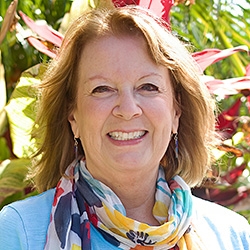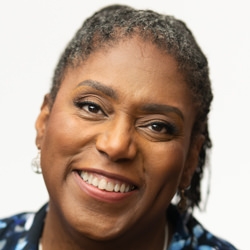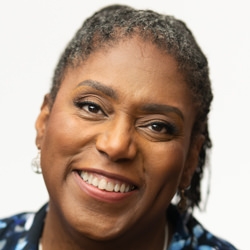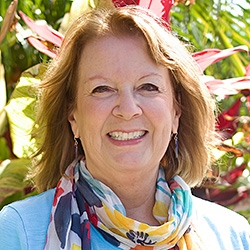
Search Results: decision
-
Transforming organizational culture requires attention and change at the systemic level. Learn which systems are crucial for any organization to establish and clarify whether that organization is collaborative or not, and then learn how to create and strengthen a collaborative organization.
-
Enjoy listening to Miki make the distinction between leadership as a position and leadership as an orientation to life. The theme: when is it time to actively step into your vision?! Check it out.
-
Trainer Tip: Notice when you create stories about why something occurred. Commit to only observing facts. Then make decisions that are likely to give you relief and joy. For instance, if someone is late you may think that she’s inconsiderate or values another thing more than you. Instead, observe what you know—that she's later than agreed. From there, you could call her to find out what’s going on.
-
Roxy Manning shares that facilitating equitable group dynamics involves tracking attention, needs, purpose alignment, resources, and impact. Identifying patterns in attention distribution, centered needs, and maintaining alignment with the purpose enhances inclusivity. Tracking internal and external resources, especially considering identity-related differences, prevents disparities. Recognizing who bears the impact, providing support, and addressing impactful issues contribute to fostering an equitable facilitation environment.
-
Roxy Manning discusses the distinction between group purpose and group agreements. Group purpose is identified as the reason for gathering, such as learning to facilitate groups with a focus on inclusion and contribution. Group agreements are the policies or intentions to support the purpose, like creating space for all voices or forming affinity groups to address identity-specific challenges. The emphasis is on how agreements facilitate the manifestation of the group's purpose.
-
In groups, relationships and society we may not want to dominate or take away from others’ access to power, to choice, to participation in decisions, nor to shaping the vision and direction of the dynamic. And yet how do we do it anyway without knowing it? Discover how privilege operates on a societal level and becomes so invisible in groups. Learn why the conversation is usually excruciating for members of both privileged and under privileged.
-
Someone may give more weight to your ideas, decisions, and directives based on your experience and what you've learned. This could influence them to project their ideals, fears, hopes, and more onto you. In this case, you can help transform this and contribute to their connection to their own agency, authenticity, and self-trust -- while supporting their ability to learn from what you have to offer.
-
Making decisions from overwhelm can be costly for you and others. Instead, to get distance name overwhelm as it comes. Apply self-compassion. Be suspicious of your impulse to withdraw. Find ways to meet your needs. Tell others about your overwhelm. This may allow more support, connection and trust-building. Plan what to do to meet your needs next time you're overwhelmed. Tweak your plan.
-
Miki will take you step-by-step through four vital systems that support radical collaboration and foster meaning. You’ll learn how to design a decision making process, create clear statements of intent, and create a process for resolving conflict.
-
Listen as Miki works with participants. Topics: how small requests serve interdependence; NVC process vs purpose; how to respond when empathy is used to create distance; coping with verbal aggression, and more!
-
Dialogue is a life-changing, heart-opening experience. It’s collaboration instead of compromise. Join Miki Kashtan for a practical, step-by-step framework to help you understand how a community develops, how to maintain or repair a community, and how this unique process creatively supports you and each member of your community in getting things done.
-
Although we are evolutionarily designed for collaborating with others when attending to our basic needs, the weight of the systems and cultural messages we have inherited interfere. Many of us are doubtful that collaboration is possible or effective, and most of us lack both the faith and the skills to live collaboratively, regardless of cultural imperatives. Miki helps us navigate this terrain.
-
Don’t know how to effectively work through differences with others in your organization? You are not alone… Like most of us, you simply lack the training and skills – and that’s what you’ll acquire listening to this course recording. Join Miki and learn specific tools and tips that work – for everyone!
-
In this course recording, you'll encounter new abilities and learn how to collaborate effectively from WITHIN a team. You'll be invited to build on interpersonal relationships, and branch out into the exciting challenges present when people work together toward a shared purpose.
-
When there's quality connection then collaboration and creativity generosity of heart can come. Then strategies honoring everyone’s needs are easier. This requires us to trust connection, hear needs, brainstorm, experiment, prepare, and hold confidence that everyone’s needs can be met. Needs-based negotiation starts there. What derails this? Feeling urgency, listening from our (dis)likes or opinions, and dire predictions.
-
Conflict is a normal and natural part of life. To varying degrees, it happens whenever two or more people consistently spend time together. Resolving conflict effectively and peacefully, in a way in which all parties feel respected and valued, does not feel natural for those of us who grew up with punitive, adversarial, or avoidant approaches to conflict. Eric offers some tips for approaching conflict.
-
- Support family, community, and organizations to realign with life
- Get the building blocks of integrative decisions that work for all
- Learn to lean on all available capacities to dance together for liberation
- Reweave the threads of togetherness into something stronger than individual existence
-
- Connect the dots between NVC basic practices and the deeper "why" behind them
- Discover how NVC can support us in bringing tenderness to all of humanity
- Learn how to tie the NVC approach to liberation and vision
- Explore the many ways the tools of NVC support the path of liberation!
-
Trainer tip: Empathy, hearing feelings and needs behind someone’s words, can be incredibly healing -- and it can help us come to better understanding and resolution. Empathize with at least on person today. Read on for an example of applied empathy.
-
Making a decision or boundary that invites someone to be honest about their feelings can be difficult. Remember that lack of authenticity may be due to lack of awareness, inner conflict, or fear of conflict, rather than dishonesty. Offer empathy and reassurance and invite more conversation. Approach with compassion and curiosity to naturally invite more honesty.




















